Contents
- Incumbents
- Federal government
- Governors
- Events
- January
- March
- May
- June
- July
- August
- September
- October
- November
- December
- Deaths
- See also
- References
| |||||
| Decades: | |||||
|---|---|---|---|---|---|
| See also: | |||||
Events from the year 2007 in Pakistan.
| |||||
| Decades: | |||||
|---|---|---|---|---|---|
| See also: | |||||
Events from the year 2007 in Pakistan.

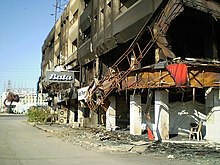
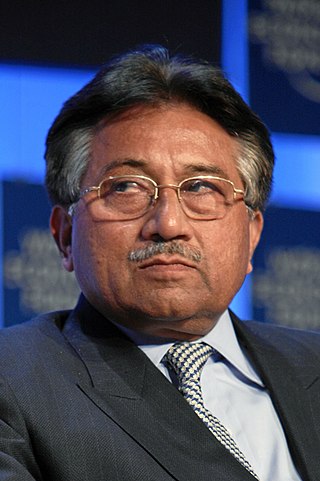
Pervez Musharraf was a Pakistani military officer and politician who served as the tenth president of Pakistan from 2001 to 2008. He also served as the 10th Chairman of the Joint Chiefs from 1998 to 2001 and the 7th Chief of Army Staff from 1998 to 2007.

Mian Muhammad Nawaz Sharif is a Pakistani businessman and politician who served as the Prime Minister of Pakistan for three non-consecutive terms. He is the longest-serving prime minister of Pakistan, having served a total of more than 9 years across three tenures. Each term has ended in his ousting.
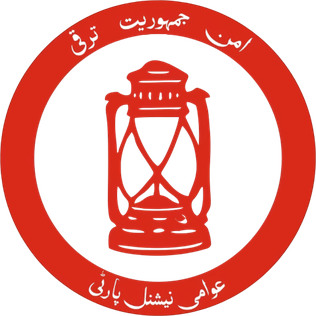
The Awami National Party is a Pashtun nationalist, secular and leftist political party in Pakistan. The party was founded by Abdul Wali Khan in 1986 and its current president is Aimal Wali Khan, great-grandson of Bacha Khan, with Mian Iftikhar Hussain serving as the Secretary-General. Part of the PPP-led cabinet of the Pakistani government during 2008−13, ANP's political position is considered left-wing, advocating for secularism, public sector government, and social egalitarianism.
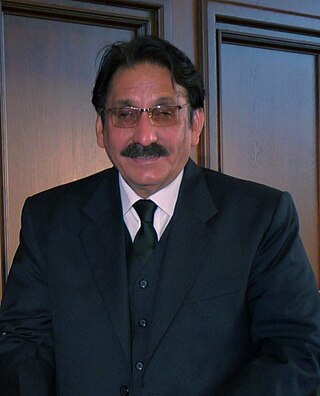
Iftikhar Muhammad Chaudhry is a Pakistani jurist who served as the 20th Chief Justice of Pakistan over three non-consecutive terms from 29 June 2005 to 11 December 2013.
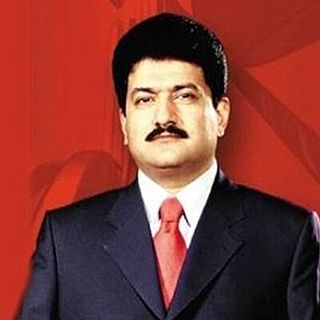
Hamid Mir is a Pakistani journalist, columnist and writer. Mir initially worked as a journalist with Pakistani newspapers. He has hosted the political talk show Capital Talk on Geo News intermittently since 2002. He writes columns for Urdu as well as English newspapers, both national and international. He has been a contributor to the Global Opinions section of The Washington Post since June 2021. He is known for his stance against the dominance of the Establishment in Pakistan. Having survived two assassination attempts, Mir has been banned from television three times, and has lost his job twice due to his stand for press freedom and human rights.
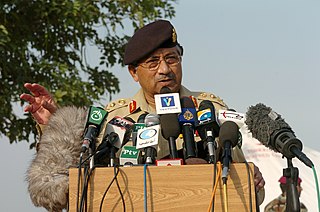
The 1999 military takeover in Pakistan was a bloodless coup d'état initiated by the military staff at the Joint Staff HQ working under the Chairman of the Joint Chiefs of Staff Committee and Chief of Army Staff General Pervez Musharraf. The instigators seized control of the civilian government of the popularly elected Prime Minister Nawaz Sharif on 12 October 1999. On 14 October, General Musharraf, acting as the country's Chief Executive, issued a controversial provisional order that suspended the Constitution of Pakistan.
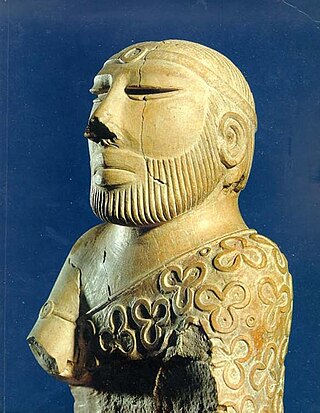
This is a timeline of Pakistani history, comprising important legal and territorial changes and political events in the region of modern-day Pakistan. To read about the background of these events, see History of Pakistan and History of the Islamic Republic of Pakistan.
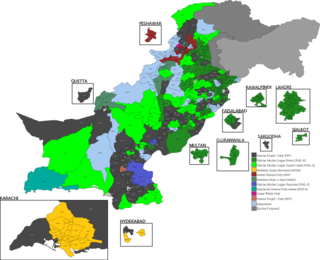
General elections were held in Pakistan on 18 February 2008 to elect members of the 13th National Assembly and the four Provincial Assemblies.
The Karsaz bombing attack occurred on 18 October 2007 in Karachi, Pakistan; it was an attack on a motorcade carrying former Prime Minister Benazir Bhutto. The bombing occurred two months before she was assassinated. The bombing resulted in at least 180 deaths and 500 injuries. Most of the dead were members of the Pakistan Peoples Party (PPP).

A state of emergency was declared by President of Pakistan Pervez Musharraf on 3 November 2007 which lasted until 15 December 2007, during which the Constitution of Pakistan was suspended. When the state of emergency was declared, Musharraf controversially held both positions of President and Chief of Army Staff. He later resigned as army chief 25 days into the emergency on 28 November. The state of emergency and its responses are generally attributed to the controversies surrounding the re-election of Musharraf during the presidential election on 6 October 2007, including his holding of both offices of President and Chief of Army Staff at the time.

Abdul Hameed Dogar is a Pakistani jurist who served as the former Justice of Sindh High Court, before being appointed Chief Justice of Pakistan by President Pervez Musharraf, after he dismissed the superior judiciary and declared emergency rule in 2007.

The assassination of Benazir Bhutto took place on 27 December 2007 in Rawalpindi, Pakistan. Benazir Bhutto, the former Prime Minister of Pakistan and then-leader of the opposition party Pakistan People's Party, had been campaigning ahead of elections scheduled for January 2008. Shots were fired at her after a political rally at Liaqat National Bagh, and a suicide bomb was detonated immediately following the shooting. She was declared dead at 18:16 local time, at Rawalpindi General Hospital. Twenty-three other people were killed by the bombing. Bhutto had previously survived a similar attempt on her life that killed at least 180 people, after her return from exile two months earlier. Following the event, the Election Commission of Pakistan postponed the general elections by a month, which saw Bhutto's party win.
Events from the year 2008 in Pakistan.

Abdul Rehman Malik NI was a Pakistani politician and a Federal Investigation Agency officer, having served as the Interior Minister from being appointed on 25 March 2008 until 16 March 2013.

The Lawyers' Movement, also known as the Movement for the Restoration of Judiciary or the Black Coat Protests, was the popular mass protest movement initiated by the lawyers of Pakistan in response to the former president and army chief Pervez Musharraf's actions of 9 March 2007 when he unconstitutionally suspended Iftikhar Muhammad Chaudhry as the chief justice of Pakistan's Supreme Court. Following the suspension of the chief justice, the Supreme Court Bar Association (SCBA) declared the judge's removal as an "assault on the independence of judiciary" and was backed by several political parties.

Tassaduq Hussain Jillani is a Pakistani judge who served as the 21st Chief Justice of Pakistan from 2013 to 2014. He previously served as a justice of the Supreme Court of Pakistan from 2004, after being nominated as a justice of the Lahore High Court by Prime Minister Benazir Bhutto in 1994.
Events from the year 2010 in Pakistan.
In 2007, 34 terrorist attacks and clashes, including suicide attacks, killings, and assassinations, resulted in 134 casualties and 245 injuries, according to the PIPS security report. The report states that Pakistan faced 20 suicide attacks during 2007, which killed at least 111, besides injuring another 234 people. The PIPS report shows visible increase in suicide attacks after the siege of Lal Masjid.
Events in the year 2014 in Pakistan.